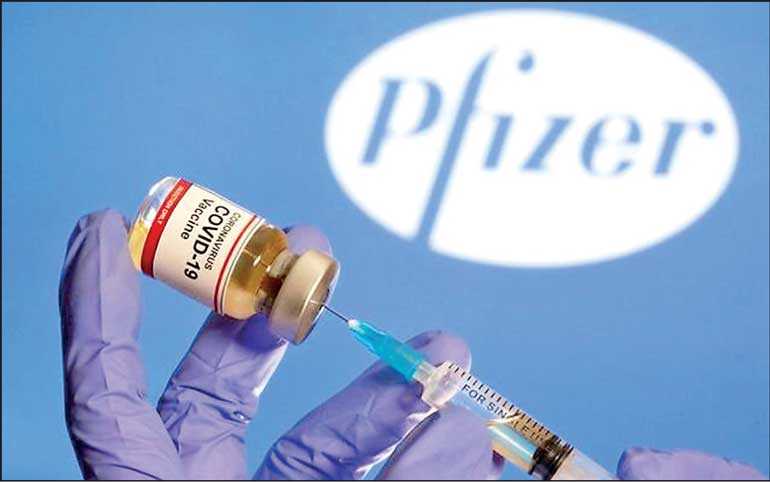Sunday Feb 22, 2026
Sunday Feb 22, 2026
Wednesday, 11 November 2020 00:00 - - {{hitsCtrl.values.hits}}

FILE PHOTO: A woman holds a small bottle labeled with a "Coronavirus COVID-19 Vaccine" sticker and a medical syringe in front of displayed Pfizer logo in this illustration taken - Reuters
Reuters: Pfizer Inc’s experimental COVID-19 vaccine is more than 90% effective based on initial trial results, the drugmaker said on Monday, a major victory in the war against a virus that has killed over a million people and battered the world’s economy.
Scientists, public health officials and investors welcomed the first successful interim data from a large-scale clinical test as a watershed moment that could help turn the tide of the pandemic if the full trial results pan out. However, mass roll-outs, which needs regulatory approval, will not happen this year and several vaccines are seen as necessary to meet massive global needs.
Pfizer and German partner BioNTech said they had found no serious safety concerns yet and expected to seek US emergency use authorization this month, raising the chance of a regulatory decision as soon as December.
If granted, the companies estimate they can roll out up to 50 million doses this year, enough to protect 25 million people, and then produce up to 1.3 billion doses in 2021.
“Today is a great day for science and humanity,” said Pfizer Chief Executive Albert Bourla, noting the data milestone comes with “infection rates setting new records, hospitals nearing over-capacity and economies struggling to reopen.”
Experts said they wanted to see the full trial data, but the preliminary results looked encouraging.
“This news made me smile from ear to ear. It is a relief to see such positive results on this vaccine and bodes well for COVID-19 vaccines in general,” said Peter Horby, Professor of Emerging Infectious Diseases at the University of Oxford. There are still many questions, such as how effective the vaccine is by ethnicity or age and how long immunity may last.
“But the bottom line is, as a vaccine it’s more than 90% effective, which is extraordinary,” top US infectious diseases expert Dr. Anthony Fauci told CNN.
Pfizer expects to seek US emergency use authorization for people aged 16 to 85. To do so, it will need two months of follow-up safety data to assure no side effects crop up. That is expected to be available in the third week of November.
US Health and Human Services Secretary Alex Azar said it would take several weeks for US regulators to receive and process the data before a potential approval.
The prospect of a vaccine electrified world markets with the S&P 500 and Dow hitting record highs. JPMorgan said on Monday it expected the S&P 500 index to hit 4,000 points by early 2021 and called Pfizer’s COVID-19 vaccine and called Pfizer Inc’s COVID-19 vaccine update “one of the best backdrops for sustained gains in years.”
Pfizer shares jumped more than 8% to their highest since July last year, while BioNTech’s stock hit a record high. Mizuho Securities analyst Vamil Divan forecast the vaccine may generate sales in excess of $8.5 billion for Pfizer in 2020-2021 alone.
Shares of other vaccine developers in the final stage of testing also rose with Johnson & Johnson up nearly 4% and Moderna Inc, whose vaccine uses a similar technology as the Pfizer shot, up more than 8%. Britain’s AstraZeneca, however, fell 2%.
US President Donald Trump welcomed the test results, and the market boost: “STOCK MARKET UP BIG, VACCINE COMING SOON. REPORT 90% EFFECTIVE. SUCH GREAT NEWS!” he tweeted.
President-elect Joe Biden said the news was excellent but did not change the fact that face masks, social distancing and other health measures would be needed well into next year.
The World Health Organization called the results very positive but warned there was a funding gap of $4.5 billion that could slow access to tests, medicines and vaccines in low- and middle-income countries.
There are other challenges as well that could affect less affluent countries. The Pfizer vaccine must be shipped and stored at an extremely cold temperature, which requires necessary infrastructure. Even many US hospitals lack these super cold storage units, which may impact when and where the vaccine becomes available in many US rural areas as well.
That highlights the need for more traditional vaccines in development, such as J&J’s candidate.
